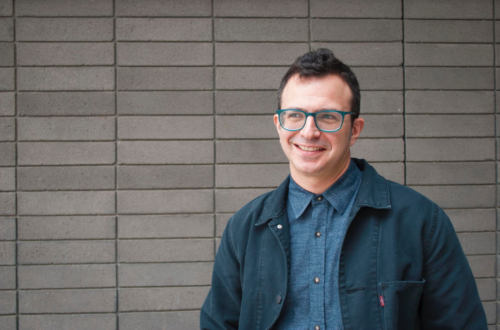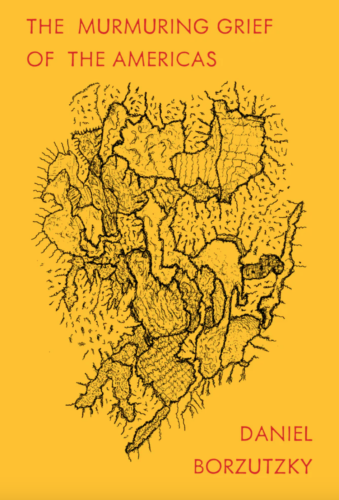there are children crossing the river some float on cardboard and somehold on to each other and some sing we are alive there are neon lightsabove the river the camera crews stand on the banks and film the riverin the right light they film the floating children in the right light theyfilm the sky turning purple and pink as fluffy pollen dissolves in thewarm air a tree with edible fruit is in the background droopy whiteflowers with long petals hang down and by the tree a brother and sisterexhausteddon’t die the director says to the children if you die we won’t be ableto make this film and if we don’t make this film there will be no evidencethat once you were alive and if there is no evidence that once you werealive then no one will know that we loved youthe children step out of the river and walk to a bridge where there is asign that says Welcome to the Promised Land but the sign is not meantfor the children it is meant for the patriots who are chasing the childrenthe patriots do not enter the scene to be documented they are thereto hunt the children they try to trap the children on the bridge butthey do not arrive in time they meet the children on the other side ofthe bridge where the camera records one of them saying welcome tothe promised land you little warthogs and there is gun shot and thechildren run off in different directions the camera doesn’t know whomto follow one child is shot in the leg and the camera zooms in on hisblood as the patriots drag him awaythe camera catches up with the children later that night when they set upcamp on a spinach farm the director takes great pleasure in filmingthe older children as they care for the young ones they feed them andbathe them and sing songs and play games like Simon Says and Simontells the children to stop speaking he tells the children to stop breathingto stop wanting to stop thinking to stop being themselves he tellsthe children to become someone else to become something else andthe children say how do we do that and Simon says you listen to theearth at the right time it will tell you what to do but he knows theearth is a liarAfter Simon puts the children to bed the camera lingers on his face as heweeps and he tells himself stop speaking and he tells himself stopbreathing and he tells himself stop eating and he looks into thecamera and says the pain in my mouth won’t stop this pain in my eyeswon’t stop my tongue is burning my lips are burning my soul needsto rest he says your soul? stop breathing he tells himself I needto die again he says because when I die again I will become the riverthat runs between myself and myself I will become the mountains thatseparate myself from myself and you will deposit new meaning into mybody as I become the story you’ve been waiting forBut in the story you’ve been waiting for I will not be an I and you willnot be a you and for several minutes water will run toward me and itwill be the river of death and I will say no no it is not the river of deathit cannot be the river of death but by the time I get the words out of mymouth the river of death will have emptied itself out and the past will notbe the past and I won’t know what it means to be dead
The Murmuring Grief of the Americas
Feature Date
- August 6, 2024
Series
Selected By
Share This Poem
Print This Poem
“The Murmuring Grief of the Americas” from THE MURMURING GRIEF OF THE AMERICAS: by Daniel Borzutsky.
Published by Coffee House Press on August 6, 2024.
Copyright © 2024 by Daniel Borzutsky.
All rights reserved.
Reproduced by Poetry Daily with permission.

Patri Hadad
Daniel Borzutzky is a poet and Spanish-language translator from Chicago. His most recent books are The Murmuring Grief of the Americas (2024), and Written After a Massacre in the Year 2018 (2021). His 2016 collection, The Performance of Becoming Human, received the National Book Award. Lake Michigan (2018) was a finalist for the Griffin International Poetry Prize. His most recent translations are Cecilia Vicuña’s The Deer Book (2024); and Paula Ilabaca Nuñez’s The Loose Pearl (2022), winner of the PEN Award for Poetry in Translation. His translation of Galo Ghigliotto’s Valdivia received the American Literary Translator’s Association’s 2017 National Translation Award, and he has also translated collections by Raúl Zurita, and Jaime Luis Huenún.
He teaches English and Latin American and Latino Studies at the University of Illinois at Chicago.

Minneapolis, Minnesota
In The Murmuring Grief of the Americas, 2016 National Book Award winner Daniel Borzutzky holds to account the private interests driving Western humanitarian decisions, laying bare the immense toll of exploitative labor practices and the self-serving nature of authoritative bodies. These powerful, musical poems explore our hemispheric grief under the yokes of labyrinthine immigration policies, militarized policing, and mass capitalism.
“A poet of brilliance and bewilderment facing weaponized financial instruments, Borzutzky doesn't shy away from confronting the ugly, unsavory trenches of late capitalist life.”
—Booklist, starred review
“Daniel Borzutzky is one of the most urgent, necessary, important, & truthful writers of this epoch.”
—Cait O’Kane, Tripwire
“Borzutzky remains one of contemporary poetry’s most incisive surveyors of cultural and institutional rot."
—Library Journal
Poetry Daily Depends on You
With your support, we make reading the best contemporary poetry a treasured daily experience. Consider a contribution today.



